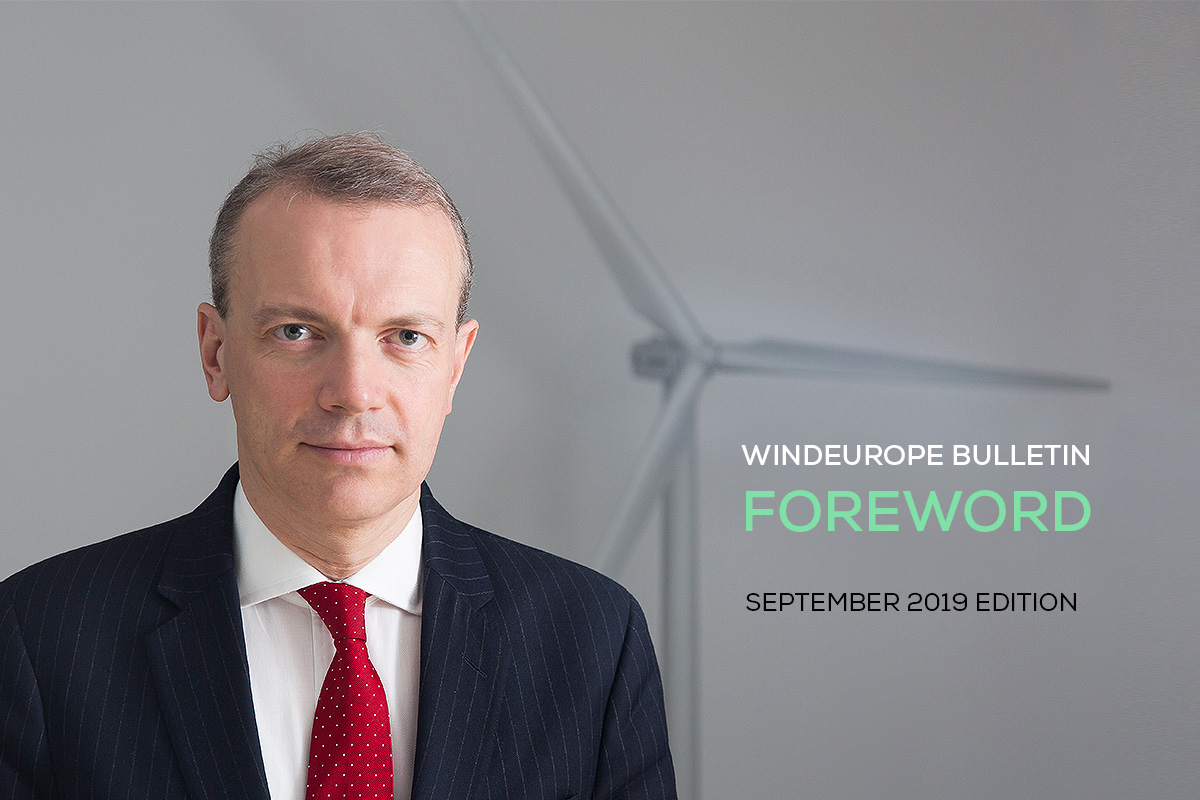News
WindEurope Bulletin September 2019 CEO Foreword on new EU Commissioners

18 September 2019
CEO Foreword
Autumn 2019 is a significant “start of term” for our industry. Ursula von der Leyen, who takes over as EU Commission President on 1 November for 5 years, has now announced her team. She has chosen Kadri Simson as Energy Commissioner. Simson is the Economy and Energy Minister of Estonia. She brokered the agreement between EU Member States on the Clean Energy Package when Estonia had the Presidency in 2017 and is a good choice. The Commissioner for Climate Change will be Dutchman Franz Timmermans, who’ll have a powerful Executive VP role in the Commission to deliver Von der Leyen’s vision for a Green Deal for Europe.
Other key Commissioners for us will be:
- Mariya Gabriel, in charge of Research and Innovation
- Virginijus Sinkevicius, in charge of Environment and Oceans
- Phil Hogan, in charge of Trade, and
- Sylvia Goulard, in charge of Industry.
Each of the new Commissioners will need to pass hearing with the (still new) European Parliament at the start of October before they’re confirmed.
The political and economic context for the new Commission is challenging. Growth is slowing. The tensions on international trade cast an important shadow. Relations between East and Western Europe on migration and other issues are not great. And then there’s Brexit…
But the new Commission is determined to be ambitious on climate change. They will table proposals for a Green New Deal within 100 days. WindEurope have issued our own 5 priorities for the new Commission and Parliament:
- A focus on both ambition and delivery on decarbonisation: zero-net carbon by 2050 is technically and economically feasible. The 2030 National Energy & Climate Plans should make clear progress towards this goal – not least to meet the growing demand for renewable energy from consumers and industry.
- A smart approach to electricity and gas: the share of electricity in the energy mix has to rise from 24% today to at least 60% by 2050. It’s the most cost-effective and energy-efficient way to decarbonise heating, transport and much of industry. Hydrogen from renewable electricity will also have a role to play.
- Infrastructure investment: the energy transition requires major investment in grids, storage, electric vehicle charging points and other infrastructure, such as ports for offshore wind. InvestEU and any new Europe Future Fund will play a key role, alongside Structural Funds and other existing instruments.
- Research & Innovation: renewable energy needs to be a priority for the EU’s new €100bn research programme, Horizon Europe. The Commission needs to support continued innovation in technologies where Europe has led, such as onshore wind, as well as emerging technologies.
- Finally a low-carbon industrial policy with renewable energy as the backbone. The wind industry employs more than 300,000 people in Europe today and exports €8bn worth of high-tech equipment outside the EU each year. Being able to import components and materials without barriers is central to the competitiveness of the European wind industry.
Finally, the continued expansion of wind means working even harder to engage the public. We cannot take for granted the general public’s support for wind energy. The recent power outage in the UK is an example of the type of story which – in the wrong hands – can be used to wrongly discredit wind energy. We won’t get wind energy at the core of Europe’s energy mix if we do not convey what wind energy means for the public. And crucially we need to do this at a very local level, where developers play a central role towards project acceptance. See our recent statement on this here.
Finally, a reminder of the two main WindEurope events this autumn:
- RE-Source 2019 in Amsterdam, 2-3 October; and
- WindEurope Offshore 2019, Copenhagen, 26-28 November.
You can read more about these below.

– Giles Dickson
CEO, WindEurope
Want to read more and receive our regular newsletters?

